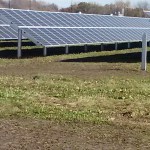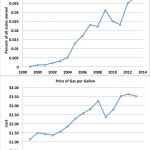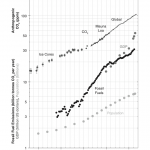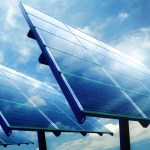energy
It is reported that ten cars exploded or burned when a BNSF oil train derailed near a small town in North Dakota.
Look at the picture above. Huxley's day care is very close to these tracks, close enough that the day care home would be totally within that zone of buring fiery debris.
There are reports here and here.
From the Star Tribune:
Oil train derails, catches fire in central North Dakota, prompting evacuation of small town
An oil train derailed and caught fire early Wednesday in a rural area of central North Dakota, prompting the evacuation of a nearby town where about three dozen…
If there is anything that the past few decades of research and study of major global challenges tells us, it is that truly effective solutions to sustainability challenges require truly integrated approaches across disciplines, fields of study, data sets, and institutions. We are not going to solve 21st century global problems with 20th century tools.
The planet is faced with a wide range of regional and global threats: air and water pollution, loss of biodiversity, a rapidly changing climate and new risks from extreme weather events, energy and food security, conflicts over resources…
Gas prices have fallen to nearly half (or more depending on your starting point) in recent months. Therefore, according to Jevons Paradox, which does indeed appear to exist sans apostrophe, use of gas should have gone up.
It did, but only by 1%.
So, we are not impressed with Jevons paradox.
The title of this post is the beginning of a more extensive comment, as follows:
Few things threaten America’s future prosperity more than climate change.
But there is growing hope. Every 2.5 minutes of every single day, the U.S. solar industry is helping to fight this battle by flipping the switch on another completed solar project.
According to GTM Research and the Solar Energy Industries Association (SEIA), the United States installed an estimated 7.4 gigawatts (GW) of solar last year — a 42 percent increase over 2013 — making it the best year ever for solar installations in America. What’…
Image of bar headed geese in flight from John Downer/Nature Picture Library/Corbis
I listened to a really interesting story on NPR this morning about new discoveries regarding the flight patterns of bar-headed geese. These birds are known for their incredible ability to fly over the Himalayas on their annual migration to central Asia. Until now, it was often assumed that the birds reached a specific altitude and then simply maintained it for the duration of their migratory route. A new study published on Thursday in Science questioned this assumption.
Dr. Doug Altshuler (…
When compared with gasoline-powered cars, vehicles fueled with electricity from renewable sources could cut air pollution-related deaths by 70 percent, according to a new study, which noted that air pollution is the country’s greatest environmental health threat.
Published this week in the Proceedings of the National Academy of Sciences, the study’s researchers examined the impact of various vehicle energy sources on the concentrations of two types of air pollutants known to affect human health: particulate matter and ground-level ozone. Previous research has found that air pollution causes…
RMU Announces Solar Plant Completion
Rochelle Municipal Utilities, in Rochelle, Illinois, has. started operation of a large Photovoltaic Solar Plant providing power to their water treatment facility. This is a great example of a project that should be done in more places.
In the Spring of 2014, RMU was awarded a $500,000 grant from the Illinois Clean Energy Community Foundation to fund construction of the Solar Plant. ICECF provides grants for up to $2/watt or 60% of the system and its installation costs, whichever is less. As a result of the competitive bidding process, Eagle Point Solar…
Last summer we were driving up north, in our Prius, and one of those coal rollers tailgated us for a while, then passed us. On the right. On the median. Jerk.
When we were trying to decide whether or not to buy a Prius, last winter, I looked into the usual things one looks into. I learned from the internet and various people that we'd never recover the extra cost of buying a Prius, because they were so expensive. So I got a little information together and called a dealer.
"I'm thinking of buying either a Subaru Forester to replace our old and beat up Forester, or a Prius. But I've been…
I could rephrase this question. What should we do about climate change. The reason I might rephrase this is because we may not be that sure of what we can do, but we should do something. Or, more accurately, some things. There are a lot of possible things we can do, and we have little time to do them. So, maybe we should do all of them for a while. We could spend years working out what the best three or four things we can do might be, and try to implement them. But there will be political opposition from the right, because the right is inexplicably opposed to any action that smells like…
In a new study just published by the journal Sustainability Science (Springer), analysis from the Pacific Institute (with lead author Dr. Juliet Christian-Smith, now at the Union of Concerned Scientists) shows that many of the fundamental responses of California water users to severe drought actually make the state’s overall water conditions worse – that in the end, many of these actions are “maladaptations.”
Water is a complex resource; and water problems are an equally complex mix of natural resource, technology, social, economic, and political conditions. When water is limited,…
Image of eyeless Mexican tetra fish from www.seriouslyfish.com by H-J Chen.
The metabolism of most animals follows a circadian rhythm that differs between the day and night. Mexican cavefish living in constant darkness, lost this circadian rhythm some time ago. In a newly published study in PLOS ONE, researchers compared the metabolic rate of both cave- and surface-dwelling Mexican tetra fish (Astyanax mexicanus). They hypothesized that since the fish living in each location naturally experience differences in food, predation as well as exposure to daily light fluctuations, they might also…
I recently reviewed Climate Smart and Energy Wise by Mark McCaffrey. The National Center for Science Education is giving away a free chapter, as a PDF, of this book. CLICK HERE TO GET IT.
Also, there is an event coming up. CLEAN Call: Climate Smart & Energy Wise Book Preview with Mark McCaffrey. Click through to get details and participate.
I've been collecting information on this topic for a while, and yesterday, I sat down to write a post that would clarify the question of the impacts of windmills on bird populations. It turns out, however, that I was totally unsatisfied with the available data on everything from windmills to building strikes to cats, so instead I wrote a post making that very point: We really have no idea. This is an interesting and important problem, though, so it is worth having a conversation about.
The post is here: "How many birds are killed by windmills and other green energy projects?"
Climate Smart & Energy Wise: Advancing Science Literacy, Knowledge, and Know-How by Mark McCaffrey is a book written primarily for teachers, to give them the information and tools they need to bring the topic of climate change effectively to their classrooms. It addresses the Climate Literacy and Energy Literacy frameworks, designed to guide teaching this important topic.
The book provides basics on climate and energy, approaches to teaching about climate and energy, and of special interest for teachers, syncing the topics with existing standards. The main point of the book is to get…
Above is a graphic someone tossed at me on twitter the other day. It makes it look like CO2 emissions went way up then went way down so everything is fine. It is, of course, a lie, of sorts.
IT is actually kind of hard to find a graph just for US CO2 that goes back in historic time, but this graphic for the global energy industry clearly shows that the big picture is an upward trend:
The dip we see in recent years is simply an effect of the economy going bad, and things people do that emit CO2 being done somewhat less. Kevin Schultz wrote this up on his blog:
After a five-year decrease in…
Every one of these is a topic I'd like to write an entire blog post about but I don't have time right now. So, YOU write the blog post!
In Michigan there is an emerging debate and discussion about using the Vast Forests in that state to provide energy. This is a good idea because it does not involve the release of fossil Carbon from fossil fuels. It is a bad idea because it involves the release of Carbon currently trapped in a medium term and important Carbon sink. It is interesting because it highlights a key feature of the whole energy and climate change thing. Sun makes burnable stuff…
Solar energy is one of the best and most easily implemented options to reduce our use of fossil Carbon based fuels. Never mind that the sun is only up and strong for part of the day, and is often covered by clouds. If you put a few square meters of solar panels on the roof of a residential or commercial building, you get clean and free (after the investment into the system) electricity thereafter. Clearly, this is an underutilized technology. In recent years there has been a precipitous drop in the cost of implementing solar energy, so it is now economically kinda dumb to not put solar…
Investment in and development of clean energy seems to be undergoing a transition, and this is reflected in a number of items that came across my desk this morning. Without attempting any serious analysis, here's a brief summary.
Clean Energy investments have fallen over the last couple of years, leading some to assert that the transition to non fossil sources of energy is in trouble. But there is an excellent argument that the exact opposite is true. What has really happened is that the cost of implementing new clean energy projects has dropped dramatically, so the cost of investment has…
This video crossed my field of vision a couple of times but I did not watch it until I saw it posted again at P3, and I am glad I did.
It is really very effective in that typically satirical way of distilling the true essence of an issue via humor, but for me it also succeeding in turning my amusement into anger. I have been immersed in this issue for a very long time, and find I do not often get upset by it anymore, an unfortunate attribute of the slow emergency.
Watch the fake advertisement above and maybe cure for yourself that all too human mental defense of normalizing the…












